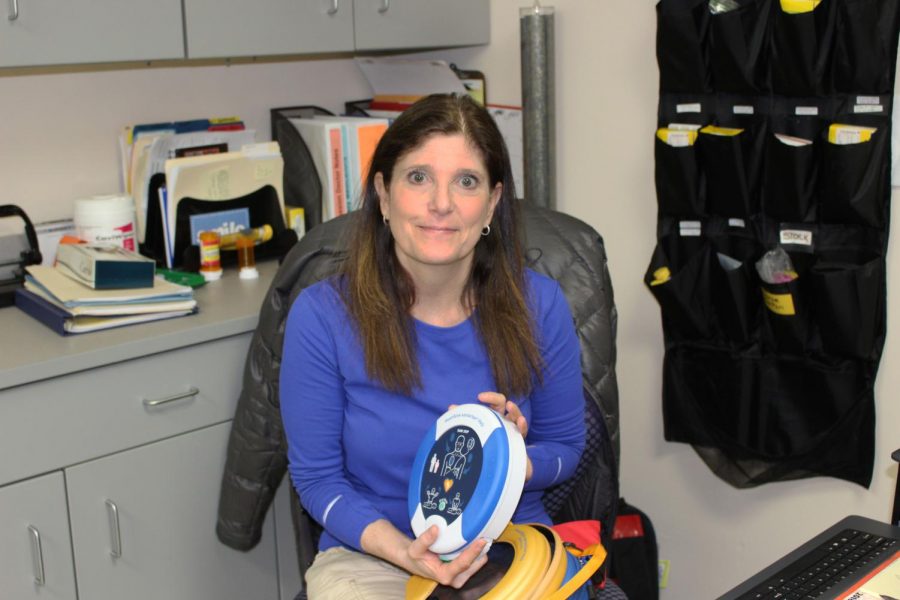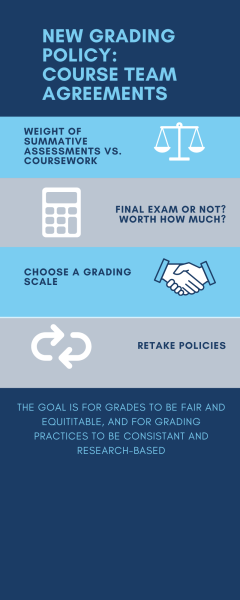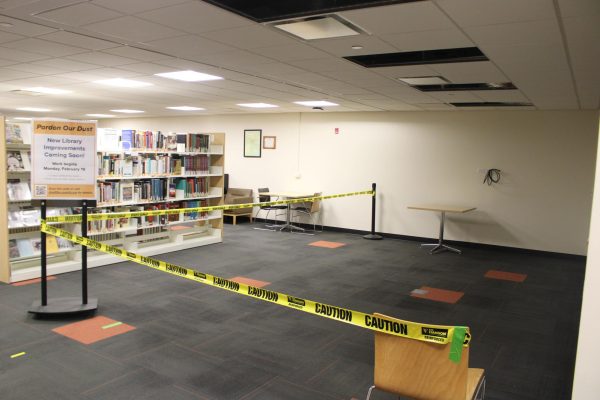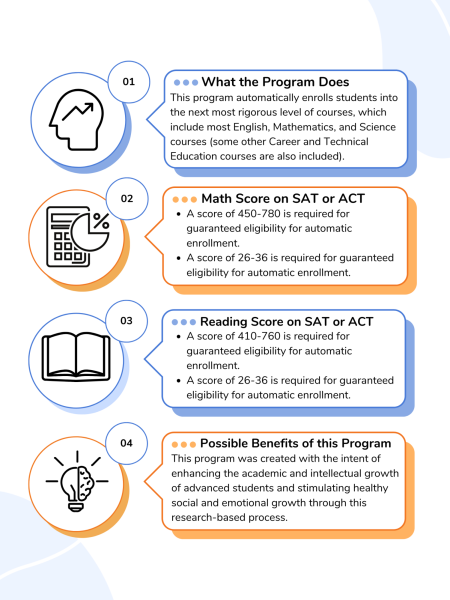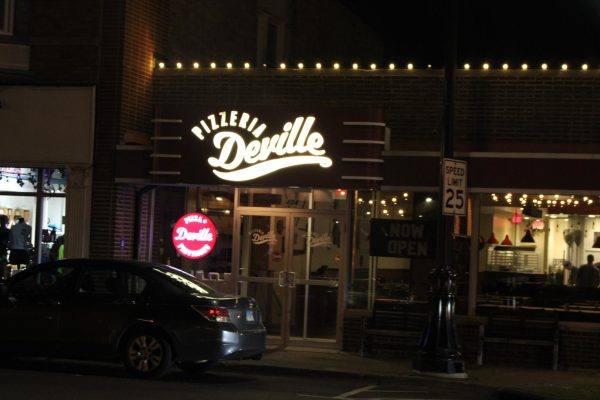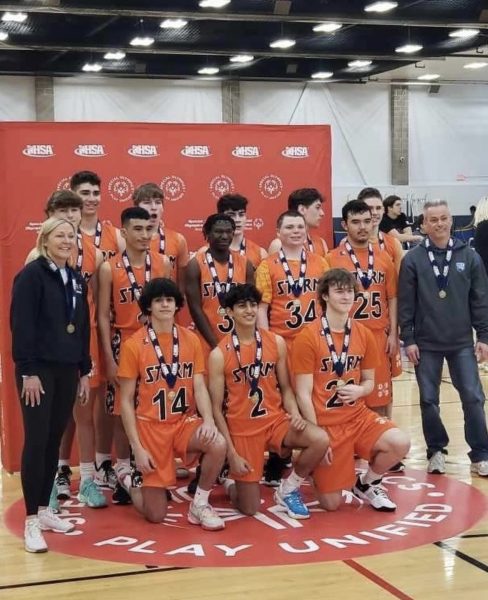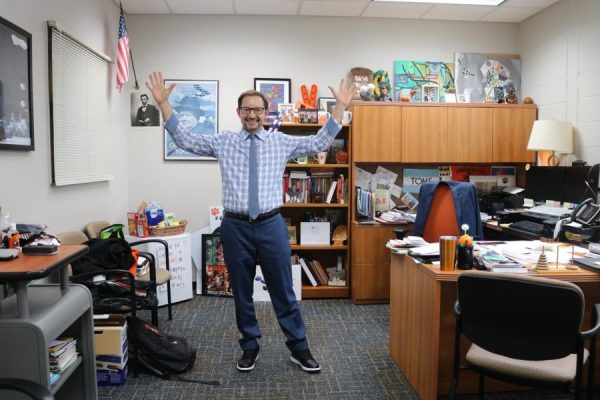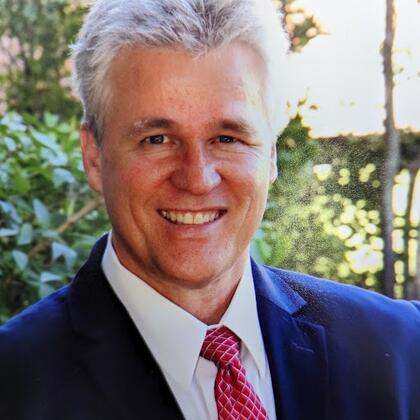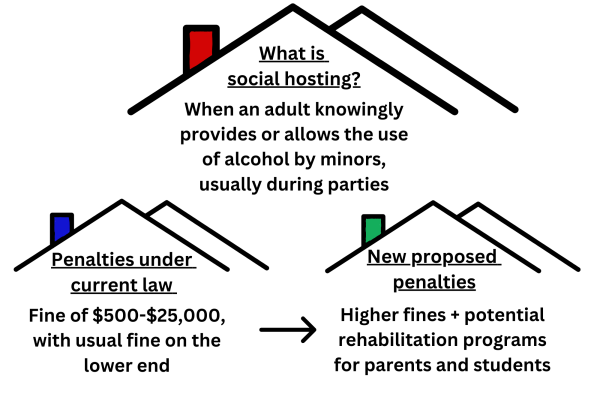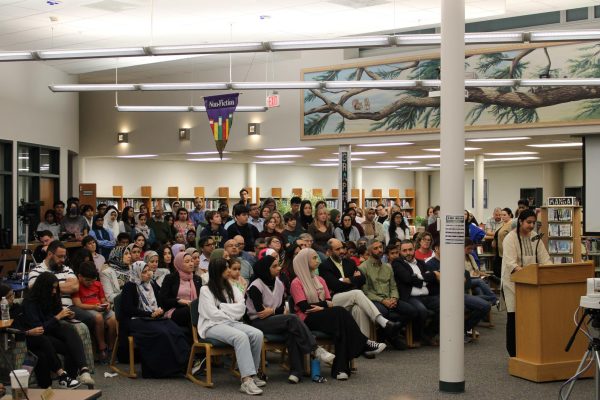Max Schewitz Foundation to visit LHS on March 13
Ms. Alisa Wasserman, one of the school’s nurses, holds an Automated External Defibrillator, which is used to help revive victims of cardiac arrest.
The Max Schewitz Foundation, a nonprofit organization run by Mary Beth Schewitz, has the dual missions of preventing sudden cardiac death, particularly in young people, and supporting wildlife conservation in Max’s name.
The Max Schewitz Foundation will visit LHS on March 13 to administer a round of cardiac screenings. Students can sign up to take a basic screening online through the LHS website. The registration will be set up closer to the actual screening, when it will likely also be posted in the announcements.
The foundation has grown since its founding after the 2005 death of 20-year-old Max Schewitz due to a sudden cardiac arrhythmia, which resulted in sudden cardiac death because of his erratic heartbeat. According to the website for the Max Schewitz Foundation, Max himself was a native of Lake Bluff and an avid supporter of reptiles and nature, later creating a business: Max and the Wild Things. From there, he was devoted to the conservation and appreciation of nature. He was praised by family and friends for his enthusiasm, passion and desire to live each day to its fullest.
Run by Max’s family and friends, one of the ways the foundation aims to spread awareness of sudden heart-related death is through cardiac screenings in high schools in Lake Forest, Gurnee, Deerfield and Libertyville.
An ECG, short for electrocardiogram and frequently called an EKG in account of the German spelling, measures the electrical activity of the heartbeat and is used to detect hidden cardiac issues that the standard preparticipation physical fails to detect 95 percent of the time. EKG screenings are oftentimes able to pick up on these previously undiagnosed cardiac conditions that, though rare, can have dire consequences.
“We find students at every single high school who have heart conditions that were not previously diagnosed,” emphasized Ms. Schewitz, Max’s mother. Some of these cardiac issues are mild and don’t prevent students from participating in varsity-level sports, while others are very severe and have required procedures such as open-heart surgery.
“To me, [EKG screenings] are absolutely worth it if we just find one kid — that’s one kid saved,” stated LHS nurse Ms. Cameron Traut. She is an avid supporter of the Max Schewitz Foundation and appreciates their visits to LHS year after year. “I love that our district is so supportive of [testing],” she added.
One of the ways LHS has shown support for the Max Schewitz Foundation is by funding the expenses of the test with the addition of the echocardiogram test that can be administered in the school. This test uses electrodes to check the heart rhythm along with ultrasound technology to examine how blood moves through the heart. Previously, students with an anomaly on their EKG would have to find a cardiologist to take the echocardiogram, but now students can advance to the next level of testing at LHS.
Working with LHS to administer cardiac screenings has, according to Ms. Schewitz, been seamless over the years: “[The LHS] administration understands and supports our mission completely; they have been very supportive and always have good turnout and promotion,” she expressed.
Ms. Traut agreed that LHS attempts to garner support among the student body for the screenings. “My job is to translate the information from the foundation to a student’s perspective to help them and anticipate what they might be thinking, what might be worried about,” she commented.
Many young adults with cardiac issues can live without symptoms their entire life, while for others, the first and only symptom is death. “The consequences of not knowing can be devastating,” stated Ms. Schewitz. “It’s not something where you get a do-over.”
She added that, in recent years, national leaders have not placed EKG testing as a priority in professional or junior-level athletics.
“[Physicians] also are looking for leadership from the American Heart Association, who does not endorse this. They endorse a screening questionnaire that fails to detect 95-96 percent of all cases of hidden heart conditions,” explained Ms. Schewitz. She stated it was disappointing to the Foundation, given they would like EKG screenings to be a standard of care nationwide.
There is also a pushback against EKG screenings from physicians themselves. Ms. Schewitz explained that screenings require a specific skill set and there is no financial benefit to providing screenings. Some physicians are also unwilling to take the risk of not catching a cardiac issue in the screening and thus having liability issues, although this is increasingly rare due to improving technology, Ms. Schewitz said.
Convincing students and parents to take multiple low-cost screenings can be a struggle as well.
“The greatest risk of dying from a hidden heart condition is between the ages of 17 and 22, so [high school students] are just at the right time to be getting multiple tests to see if there is something that might manifest itself when you go off to college,” said Ms. Schewitz. She advised taking a screening once a year from ages 14 to 28 in order to be aware of cardiac issues and subsequent treatment.
Despite obstacles in advocating for more EKG screenings, the tests have gained momentum in the past few years, with the Max Schewitz Foundation reaching out to more high schools as well as local colleges.
“Even over the last 10 years, people are more aware that [cardiac issues] might be a potential issue, so you have AEDs in buildings and schools,” stated Ms. Traut. An AED, which stands for automated external defibrillator, is a medical device that assesses heart rhythm and, if necessary, delivers an electric shock to return the heart to its normal heartbeat. They are widely considered user-friendly, instructing the user of how exactly to treat the person in need.
At LHS, there are 19 AEDs spread around the building so that if an emergency occurs, there is an AED within a 30-second distance. This ensures any case of cardiac issues within the school can be treated immediately and effectively, Ms. Traut said.
Despite issues at a national level that make EKGs less accessible, Ms. Schewitz is optimistic: “I am hopeful that with continued and increased testing, awareness of the value of low-cost EKGs [will make] testing more readily available to all young adults in the United States.”



